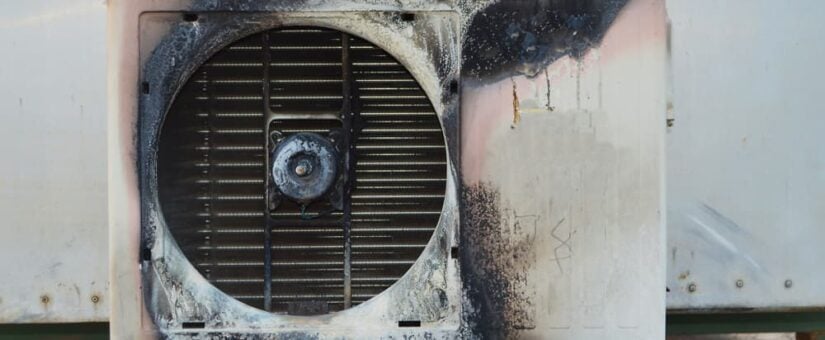
- On June 2, 2021
It can be challenging to know when it’s time to replace the central air conditioner. After reading our guide on making that decision, you’ll learn:
- The average age of an air conditioner system is 15 to 20 years nationally, but Arizona residents should expect their system to begin faltering well before that.
- Increased energy bills may be a sign that your air conditioner is becoming less efficient.
- Smart home technology allows you to control and monitor new air conditioner models in impressive ways.
Air conditioners don’t live forever. Even if they aren’t close to the end of their typical lifespan, you can gain several benefits from replacing an old air conditioner with a brand new one. If you find yourself unsure whether it’s better to seek out air conditioning replacement or continue your current maintenance and repair routine with your current one, it helps to know the different considerations that can help you make the right decision.
Your Air Conditioner is Old
According to the Department of Energy, the average lifespan of an air conditioner is 15 to 20 years old. Of course, this is an average taken from across the states and includes areas where air conditioners are rarely used, such as the temperate Pacific Northwest and locations where the A/C is used every month of the year in Arizona. For instance, an air conditioner in Seattle may last well into its second decade of operation, but an A/C system in a Phoenix home may be lucky to last even a dozen years.
Beyond its regular use, various factors will determine how long your air conditioner lasts. Routine maintenance and prompt repairs typically help to extend the life of the system. Another factor is the quality of the initial installation. So, if you hired skilled professionals to install your system and use trained technicians to inspect and maintain your A/C at least once a year, you may be able to eke out a couple of extra years of use.
However, the bottom line is that most residents of the Phoenix area should start to consider replacing their central air conditioner a decade after its installation. Even if the system hasn’t completely fallen apart, you may be facing that situation soon, and new models are far more efficient than those a decade old.
Your Energy Bills Are Getting Higher
An air conditioner’s job is to keep your home comfortable when the temperature outside is surging upwards. While you don’t pay your air conditioner a salary to do that, you pay monthly energy and utility bills that are dramatically affected by how efficiently your A/C system works. The less efficient your air conditioner is, the higher your energy bills will be.
This relationship between your utility bills and the air conditioner’s energy efficiency can be reversed as well. If you notice creeping or drastic increases in your energy bill without changing how you use your A/C, your air conditioner is likely starting to work harder to deliver the same output it did before.
These higher utility bills can indicate that your A/C system is about to go kaput, but it may simply be a sign that your air conditioner is no longer in peak condition. The Department of Energy estimates that replacing a model that’s only ten years old with a more efficient model can help reduce monthly cooling energy costs by 20% to 40%. So, if you notice that you’re paying more each month for energy, it may be time to replace your central air conditioner.
You Notice Excessive Dust or Odd Aromas
Nobody likes dust. If you notice that your home seems constantly dusty, even after you’ve cleaned, this can be a sign that your air conditioner needs to be repaired if not outright replaced. Most air conditioning systems work by blowing cold air through a series of ducts. The air then exits through vents in your living room, bedroom, and other areas of the home.
Ideally, these ducts should be leakproof. However, eventually, the perfect seal of the duct will begin to falter. This causes dust to easily enter the ducts then be blown throughout your home. Leaks in your ductwork also force your air conditioner to work harder to cool your home, as a portion of that cooled air will exit before it reaches the vent.
As air conditioners get older, they can also begin to give off odd sounds or aromas. Any chemical smell should result in you immediately calling for repairs, but in less extreme circumstances, you may just notice a musty or stale scent.
Your Home Doesn’t Stay at a Consistent Temperature
Your air conditioner should help keep your home at a consistent temperature. While the placement of vents plays a role here, you shouldn’t notice a wild swing in temperatures as you go from one vented room to another. Likewise, even if the temperature throughout the home is relatively the same, you don’t want the temperatures over time to dramatically rise and fall as your A/C struggles to switch on or keep up with the Arizona heat.
As these inconsistencies come into play and you find yourself checking and adjusting your thermostat repeatedly, your air conditioning system is likely malfunctioning in some way. Part of the system may be leaky, or the central cooling coils may be damaged. Either way, if you can’t keep your home at a comfortable temperature, you should replace your central air conditioner.
Your Air Conditioning Needs Have Changed
An air conditioning system is designed to cool particular square footage of your home. That means that if your home changes in any way, you may need a new air conditioner to meet your needs.
For example, you may decide to enclose a porch or build an addition to your home. Maybe you’ve turned a once unused portion of your home into a livable space for your parent, child, or even a new hobby. Each of these things can strain your old system and cause it to work inefficiently and expensively.
However, the change inside your home may not be physical. It could also be technological. As more and more people incorporate smart home systems into their living spaces, having an old air conditioner can become a nuisance. New models allow you to control your system by issuing a voice command to the nearest smart speaker or through an app on your phone. You can also automate and monitor your system so you can ensure it’s working efficiently and as designed.
Five Ways to Know Your Air Conditioner Is On its Way Out
How long does a central air conditioner last? In Maine, it could last a lifetime. In Phoenix, it may not last 15 years. Our hot desert climate and our usage all take a toll on air conditioners. Even if you had a system installed when you purchased your home, you may be facing replacement.
These five signs could help you know the time is right to replace your central air conditioner.
#1 Its Age
Around Phoenix, air conditioners work extra hard. Our air quality is a known problem, so filters become clogged, particulates damage interior parts, and humidity levels fluctuate. Most homeowners run their central air conditioners longer in the Valley than elsewhere in the nation. All this combines to shorten life spans. The other benefit of replacing an older unit is improved energy efficiency, which leads to our second sign.
#2 Your Energy Bills
If you notice your utility bills are climbing, your central air conditioner’s energy efficiency is dropping. You can expect this over time, but a sudden rise in costs could signal the system’s end. More modern central air conditioners can achieve far higher efficiency, as measured by Annual Fuel Utilization Efficiency (AFUE), with some models providing 98 percent AFUE.
#3 Frequency of Repairs
Typically, Phoenix homeowners will have an annual service visit and perhaps one service call in a cooling season. If you are on a first-name basis with all the technicians repairing your HVAC, your central air conditioner may be so far gone a new system is economically smart.
See also: 5 things to check before calling an HVAC repairman
#4 Your Family’s Comfort
Plain and simple, if your home is not comfortable no matter how often your HVAC repairman visits and adjusts your system, your air conditioner may be too old. High (or low) humidity, unreliable cooling, or hot spots in your home all point toward an uncomfortable home.
A recent change to your home, such as addition, conversion of a porch to a sunroom, or remodeling can affect performance. Your central air conditioner is sized to specific square footage, so it cannot cool additional rooms.
#5 Strange Sounds & Smells
Grinding, chattering or squealing noises are not typical in central air conditioners. If you hear odd sounds — or smell burning rubber, chemical odors, or other unexpected scents — contact your HVAC contractor. Aging systems will develop many unusual conditions, so strange sounds, and smells can indicate the end of your air conditioner.
Call Howard Air & Plumbing Today for All Your Air Conditioner Replacement Needs
It isn’t always easy to tell when it’s better to keep maintaining and repairing your old air conditioner system or replace it with a newer model. At Howard Air & Plumbing, we can assess your current situation, walk you through the decision-making process, and help you find ways to save on your new system through financing or rebate offers. Click here to contact our team.


















0 Comments